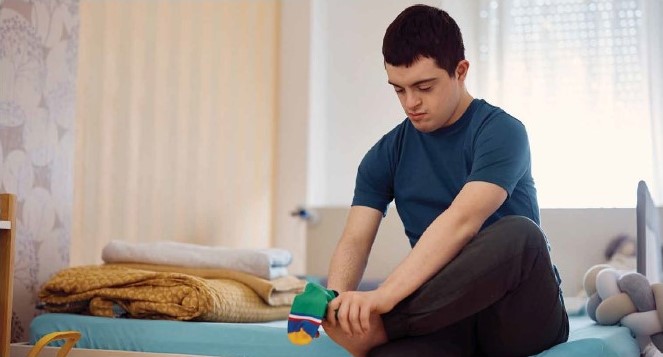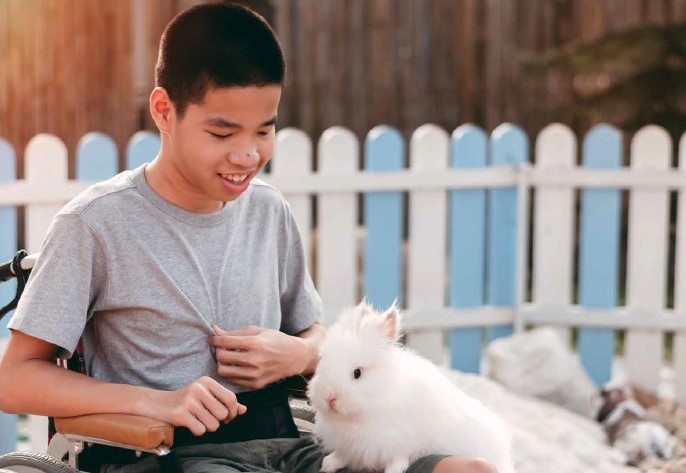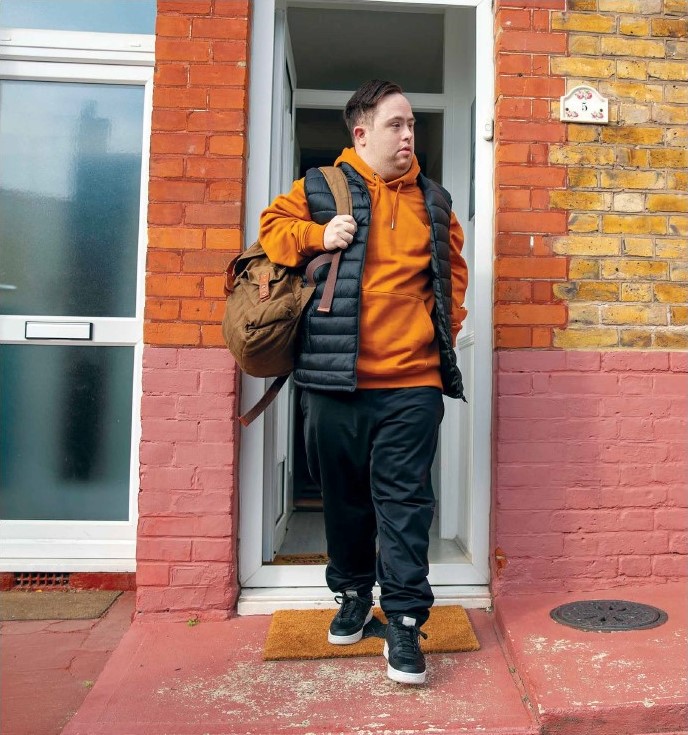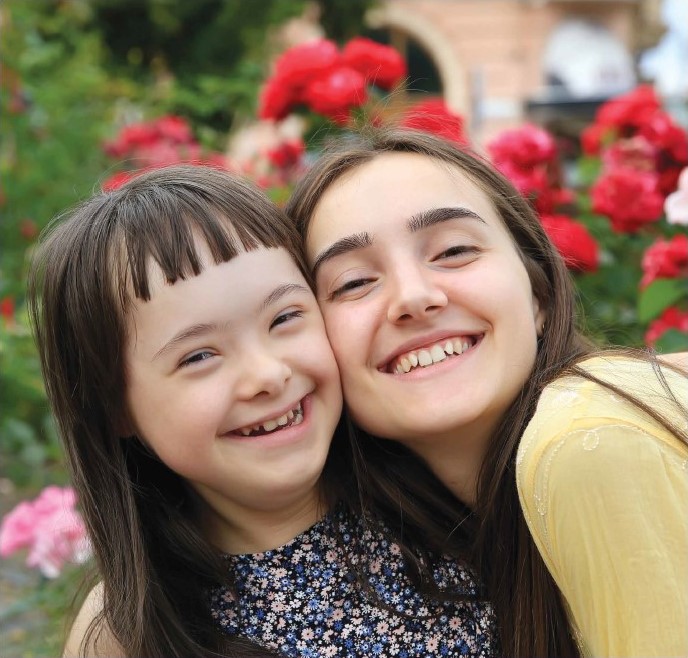This is a guide to our Final Report on the review of the NDIS. In this guide you will find information on the topics from our Final Report that you told us matter most to you.
On this page
- Letter from the panel
- Our approach
- Listening across Australia
- A connected system of support
- Help to find your way around the new system
- Changes to access, budgets and planning
- Better support for children and their families
- A new approach to psychosocial disability and mental health
- Fairer options for housing and living supports
- Quality, safety and integrity in the service system
- Working together from here
- A final word
- Auslan translation of the easy read: A better NDIS
Letter from the panel
It has been an enormous privilege to work together with the disability community on the Independent Review of the NDIS.
Our work started in October 2022. We were asked to look at ways to improve both the experience of participants in the scheme and their outcomes. We were also asked to look at ways to make sure the scheme is sustainable so it is around for years to come.
It was a big job. We knew we would need all of the panel’s combined experience and expertise.
But most of all, we knew we needed all of the experience and expertise of the disability community.
We wanted to do this Review differently from other government reviews, and wanted to make sure we heard from as many people as possible. We consulted widely to look at the issues people with disability, their families and the disability community told us needed to improve or change.
In our Final Report, we make 26 recommendations. Underneath each recommendation there are a series of detailed actions - 139 in total. We have also pulled together a lot of detailed information to explain our recommendations. All of this work is on our website.
We have designed all the recommendations and actions to work together. They must be considered as a total package of reform.
Our view is that you can’t fix the NDIS without fixing everything around it. For this reason our recommendations go beyond the NDIS. We want to create a new system of support, including accessible and inclusive mainstream services, a new system of foundational supports as well as the NDIS. This will make sure the 2.5 million Australians with disability under 65 can get what they need.
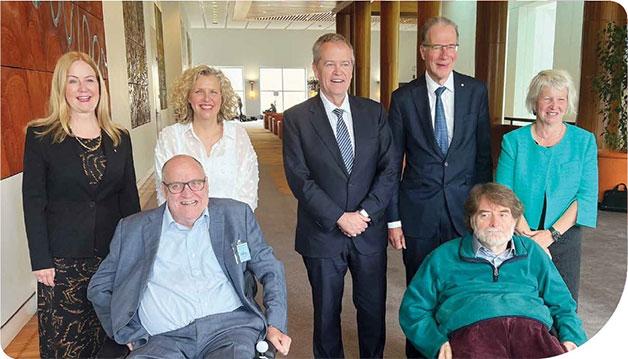
The NDIS Review was announced at Parliament House on 18 October 2022. Pictured left to right: Ms Lisa Paul AO PSM, Kevin Cocks AM, Professor Kirsten Deane OAM, Hon Bill Shorten MP, Professor Bruce Bonyhady AM, Douglas Herd and Judith Brewer AO. (Dr Stephen King not pictured.)
We know that you have lots of questions about these changes, and might be worried about what impact they could have on you. We also know you have questions about when and how they will happen.
In our Final Report we suggest our recommendations happen over 5 years. The timing is important. Some changes will need to happen before others are possible. Some can be actioned straight away. Others are going to take more time.
There are two things we would like you to keep in mind when reading this guide.
First, while we focus on the needs of all participants when thinking about change, we have given particular consideration to the intersectional needs of First Nations, culturally and linguistically diverse and LGBTIQA+SB people with disability.
Second, our Final Report includes recommendations which are not covered in this short guide. If you would like more information about all of our recommendations and actions, we encourage you to read our full report and other materials on our website.
Finally, we know that how we change is as important as what we change. We think these important changes must be made working together with the whole disability community.
Many people came together to fight for the NDIS more than ten years ago. We hope everyone will come together now to make sure the NDIS delivers on that promise.
Back to topOur approach
When we began the Review, we wanted to provide lots of different opportunities for people to have their say. Throughout our Review we:
- heard from 10,000 people
- received just under 4000 submissions
- averaged 26 engagements every month
- spoke with more than 1000 people with disability and spent more than 2000 hours listening to their stories ideas and feedback.
Submissions came to us in many different ways, including written, video, Auslan, artwork and poetry. We also asked Disability Representative Organisations and other disability organisations to help us engage with their communities. They included organisations such as First People’s Disability Network, Every Australian Counts, Autism Alliance and Autism Queensland, Women with Disabilities Australia, Children and Young People with Disability and many more. We also worked closely with a small group of people to test and improve some of our ideas. We brought together people with disability, people with operational and service delivery expertise, and sector representatives. There were 26 sessions held during the time of the Review. Our consultation had two stages:
- Defining the problem – we listened to you and learned about your experiences and challenges. We summarised what you told us in our What we have heard report, released in June 2023.
- Designing solutions – we asked you for solutions to the problems and issues you told us about.
All of the information we received from you informed our Final Report. We are grateful to everyone who took the time to help us understand their experiences, and for giving us their ideas for improvement.
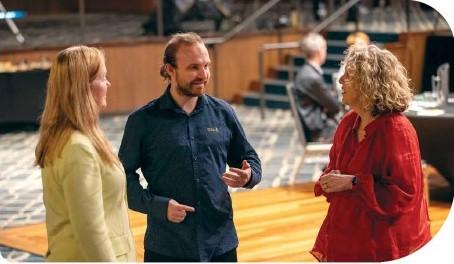
NDIS participant Chris speaks to Lisa and Kirsten in Newcastle.
Back to topListening across Australia
3,976 Review submissions
287 Australia wide engagements
16 Disability Representative Organisations
26 idea testing sessions
130 submissions from peak bodies
Total engagements
- 14 Webinars
- 155 Virtual consultations
- 80 Face to Face
Regional, rural and remote engagements
- 9 Virtual consultations
- 29 Face to Face
Public event registrations
- 1,520 registrations
Online submissions
- 3150 By individuals
- 746 On behalf of organisations
Phone interviews
- 73 Phone Interviews
A connected system of support
The NDIS was always meant to be one part of a connected system of support. You should be able to use mainstream services like health and education in the same way as other Australians. You should also be able to take part in community activities in the same way as others in your community. But you told us that doesn’t happen at the moment. Supports are not planned or organised or funded as a whole. And there is not enough support outside the NDIS. There are gaps and people are missing out. This isn’t fair.
What would change?
We want the entire disability support system to be planned, organised and connected. It should look like this:
- At the bottom layer of the system are mainstream services and community supports. They should be accessible and inclusive for all Australians, including people with disability.
- In the middle layers are ‘general and targeted foundational supports’. This is a new idea we have recommended.
- At the top layer are ‘individual supports’, which are funded through the NDIS. These would be provided alongside foundational supports and mainstream services.
Examples may include
Individual supports: Daily personal activities, therapeutic supports, home modifications, assistive technology as part of your NDIS budget.
Targeted foundational supports: Home and community supports, personal assistance, early supports for children, targeted supports for adolescents.
General foundational supports: Assistance to navigate the support system, information and advice, peer support and advocacy for individuals, families and communities.
Mainstream services and community supports: Public education, health employment, housing, justice and transport. Activities based in the community from organisations like sporting clubs and charities.
What does this look like?
The new foundational supports would improve and expand activities and programs currently funded through the Information Linkages and Capacity Building grants program.
We want foundational supports to be more widely available to help more people, families and communities. Foundational supports would be for participants in the NDIS and people with disability outside the NDIS who are under the age of 65.
We have recommended two types of foundational supports, general and targeted.
General foundational supports may include things like:
- Assistance to navigate the support system, including the NDIS
- Independent information and advice
- Peer support and self advocacy
- Disability employment supports.
Targeted foundational supports may include things like:
- Home and community supports for people with less intensive support needs such as help with everyday activities like shopping and cleaning
- Early supports for children and their families or targeted supports for adolescents.
The goal is to make sure you have the support you need to be fully included in your community. We know that the scheme has not always broken down barriers and increased inclusion. We want that to change.
To make this all work, we need two things. First, we need a much greater investment in foundational supports. Second, we need mainstream services to be more accessible. All governments should be accountable for delivering supports for people with disability. We need a genuine partnership and commitment for governments to do this together.
This is why we recommend an intergovernmental agreement to make this new connected system of supports happen.
Back to top
“Things like some degree of basic assistance with looking after your house, services to help people connect to their community, help with shopping and food prep, transport, are all things that could be available in the community.”
Kira
Help to find your way around the new system
You told us that trying to work your way through the NDIS is hard. At the moment there are lots of different people to help navigate the NDIS and connect to services. These include Partners in the Community (Local Area Coordinators and Early Childhood Partners), support coordinators, specialist support coordinators, community connectors, plan managers and NDIA Health and Justice Liaison Officers. All of the different roles are confusing, access and quality are variable, and despite the number of roles, there are still gaps. Many of you don’t have a single point of contact.
What would change?
We recommend creating a new navigator role. They would be someone who works for you.
There would be two main types of navigators:
- General navigators would help you connect to mainstream and foundational supports and if you are in the NDIS, help you find and coordinate services. If you have an intellectual disability, they can help connect you with supports for decision making.
- Specialist navigators would help participants with complex needs and particular groups of participants who need more support.
There would be additional help for people with psychosocial disability, and those who need home and living supports and at key life transitions.
We know this is a big change. We understand that you might be worried about what will happen to the people you rely on to help you now. We think many existing support coordinators would be well placed to move into these new roles. These changes need to be introduced slowly and carefully, and in close consultation with the disability community.
What does this look like?
If you have a disability and need some assistance, your health professional would connect you with a navigator in your local area.
Your navigator would work with you and the other people in your life to help you understand the system, achieve what is important to you and help you find support to do it. They could also help you apply for the NDIS.
If you are in the NDIS, your navigator would also work with you to find local services that meet your needs and get the most out of your budget.
They would help you build connections in your community, regularly check in to see how your supports are going and help you change providers if you need to.
And if you don’t need much help from a navigator that’s fine too. Their role is to make sure you have what you need to make decisions and get on with your life.
Back to top
“Families need the support of an advocate who can guide them through the system and provide assistance in navigating the complexities of the process.
This advocate should be available to families for as long as necessary, recognizing that any delays or challenges in accessing support services are a result of the system’s difficulty and bureaucracy.
It is essential that the NDIA takes responsibility for the system’s complexity and covers the cost of providing the advocate support to families. By offering an advocate, families can receive the guidance and support they need to ensure their child with a disability thrives within the system.”
Shannon
Changes to access, budgets and planning
You told us that accessing the NDIS is complicated and confusing. It can be expensive to get reports, and decisions don’t always seem fair or consistent.
You told us the planning and budget setting process is also unclear, complicated and stressful. It is focuses on what people can’t do, instead of what they can. You told us the NDIA doesn’t explain why it makes the decisions it does, and outcomes are not always fair or consistent.
What would change?
We recommend changes to three areas:
- Accessing the NDIS
- Setting a budget
- Creating a plan of action to get the most out of your budget
Accessing the NDIS
Applying to the NDIS must be easier and fairer.
Access should be based on the impact your disability or disabilities have on your day-to-day life. It should not be based on a medical diagnosis alone or just your primary diagnosis.
We also want you to have more help to apply to the NDIS. No one should be worried about whether or not they can afford to get the reports they need. If assessments are needed for your application, they would be arranged and paid for by the NDIS.
Navigators would also be there for you if you need help to work your way through the process.
Setting your budget
We need a clear and fair way to determine your NDIS budget to meet your needs. We want a better way to gather information about you, your circumstances, your goals and your daily support needs. We think more needs to be invested in getting your budget right to meet your needs.
The new process would start by collecting information from you, your family (if relevant) and any treating professionals you have in your life. It would also include an assessment of your support needs - what support you need as you go about your day.
This would be a comprehensive assessment.
This would be done in person with a qualified and trained assessor, with enough time to do the job well and ensure you are listened to. Assessments would happen where you are comfortable and want them to happen, such as in your home.
Your budget would be set based on your comprehensive needs assessment. For most participants the assessor would be the person setting the budget. That means, for most people, you should meet the person making the decisions about your funding.
Creating a plan of action to get the most out of your budget
Once the budget is set, you would have much more flexibility to spend your budget, with a navigator to help you find services and supports that work for you.
We also recommend front line staff should have the right skills and training so they can work with you in a respectful way. This includes making sure staff work in a trauma informed and culturally appropriate way and respond appropriately to the intersectional needs of participants.
What does this look like?
At the moment, budget setting and planning are rolled up into one process. We recommend breaking it up into clear separate steps, and giving people more help at every stage:
- A new access request form with more help to complete it.
- Access based on an assessment of the impact of your disability.
- A comprehensive needs assessment done by a qualified and skilled professional.
- A budget is set based on your needs assessment.
- A navigator helps you create a plan on how to use your budget and find supports that work for you.
You probably have lots of questions about the new process and how your NDIS budget would be set. We also know the attempt to introduce independent assessments has left everyone worried about how any assessments would work and how they might be translated into a budget.
“I think the best thing for the NDIS would be for the person who makes the decision to have to meet with the participant and get to know them as a person, not an application.
Equally, decision makers should be required to speak to participants / participant representatives to explain why they don’t believe they have enough evidence to approve a funding request and give the participant an opportunity to provide additional information before declining.”
Neale
We recommend that government works with people with disability, their families and their representative organisations to choose the assessments to be used, the way the process would work and how all the information collected would be translated into a budget. The new way of doing assessments would be valid and transparent. We hope this provides reassurance to you that the process would be very different to what was proposed before.
The new access, budget and planning process
Find out about disability and supports available
Access a navigator
Access inclusive local and mainstream support
Find out about the NDIS
Apply to the NDIS
Complete assessments to understand need & set a budget Receive a budget
Develop a plan of action
Access supports
Check-in on progress
Better support for children and their families
You told us that the NDIS is not working well for children and their families. There is too much focus on diagnosis and not enough on support needs. There is no consistent approach to identifying developmental concerns early, or helping families find evidence-based supports that work for them. There is not enough support for children in everyday settings, where they live, play and learn. We know that many children with disability and developmental concerns and their families experience barriers to being included in childcare, early education and school.
What would change?
We want to make sure that children with disability and developmental concerns are identified early, and get the support they need – because we know that providing the right supports early gets the best outcomes for children. We also want families to be well supported, including getting more help to find services that meet the needs of their child or children.
We recommend:
- Creating support options for children and families through mainstream services, foundational supports and the NDIS to address current gaps.
- Increasing the investment in mainstream systems and foundational supports for children with disability and developmental concerns or delays.
- Earlier checks and screening to pick up developmental concerns and provide support.
- Simpler and fairer processes to access the NDIS, not based just on diagnosis.
- Making sure budgets for children are based on assessment of support needs.
- Providing families with a key contact, a ‘lead practitioner’ who can help coordinate supports. They would be qualified and have expertise in childhood development. This would be in addition to your navigator.
- Ensuring early intervention supports are based on evidence and best practice.
What does this look like?
If you have a child with disability or developmental concerns, they should be identified as early as possible through mainstream services. This might be through your doctor or maternal and child health nurse. We want a continuum of early intervention supports to be available. Your child should get support that best meets their needs, when and where they need it.
Foundational early intervention supports are designed just for children and families. Depending on your child’s needs it might include peer support, advice, information and education to help you support your child. Or it might include some early supports from a lead practitioner.
If you have a child with higher support needs you would get early intervention supports through the NDIS. Children with higher support needs would get additional, individualised support through the NDIS via an early intervention pathway.
This might include physiotherapy, speech or occupational therapy. Your lead practitioner would give you specialised advice to help you find the right supports that works for your child and your family.
A lead practitioner would be an allied health professional skilled at working with children. They could help build a team of support around you and your family, if needed.
Back to top
“I did not know about early childhood early intervention at all. My son was experiencing speech and language difficulties and I belong to a culturally and linguistically diverse background and hence I did not know what the next step is to get help. Since a lot of parents (including me back then) are in denial about their child’s condition/development, stress the importance of early intervention and that early intervention does not mean the child has a life long disability.”
Bindi
A new approach to psychosocial disability and mental health
You told us the NDIS has not supported all people with psychosocial disability well. People with psychosocial disability continue to experience lower community participation, employment and family/carer employment than other participants in the NDIS.
You also told us that the current approaches to access, budget setting and planning don’t respond well to your changing needs and the NDIA and its partners do not have a good understanding of those needs.
What would change?
There is a need for a new, dedicated approach for people with psychosocial disability that better meets their episodic needs and is focused on personal recovery. We want to create a continuum of supports so there is help both outside and inside the NDIS.
We recommend:
- Adding an early intervention pathway for people with psychosocial disability when accessing the NDIS to support personal recovery as soon as possible.
- Establishing a coordinated approach with public mental health systems if you have complex needs.
- Prioritising the development of foundational supports for people with psychosocial disability, so those not eligible for the NDIS can receive more help.
- Establishing new standards for service providers. This would increase the supply of providers with psychosocial expertise, and a more connected, collaborative approach to psychosocial disability across the NDIS and mental health system.
- Introducing psychosocial recovery navigators to identify evidence-based supports and connect with mental health services, education and employment.
What does this look like?
Whether you’ve had psychosocial disability for some time or are coming to terms with a new diagnosis, we want specialised support to be available to you to help you on your journey.
Navigators with training and expertise in supporting people with psychosocial disability would help you find services to meet your needs. You may have had mental ill health for a long time and had some very negative experiences.
Your navigator would work with you to understand what you have tried before, and what has and has not worked. They would help you to find evidence based supports to help you live the life you want to lead.
If you have more complex needs, there would be a more coordinated approach between the NDIS and your mental health services.
Back to top
“A major concern with NDIS is the widespread lack of understanding about what psychosocial disability means, and consequently who should become participants and what supports will be required for that individual. It is extremely difficult for people with cognitive impairments, ie those with intellectual disability, psychosocial disability, acquired brain injury, etc, to navigate the NDIS, both the access, plus ongoing issues. It is essential that [they] are allocated a navigator, particularly if they don’t have competent, reliable and willing family members to assist. If people properly understood psychosocial disability, there would be less confusion about who should become participants and who should receive support from mainstream services.”
Patricia
Fairer options for housing and living supports
You told us many participants with funding for housing and living supports do not really have any choice in where or who they live with. Funding decisions are inconsistent, inequitable and unclear. And there is not enough help for people to find and explore options that would work better for them.
What would change?
We want decisions about housing and living funding to be fair and consistent. Participants with similar levels of need and circumstances should get similar amounts of funding.
Funding decisions would be made after an assessment of support need. Most participants would receive funding based on sharing supports at a ratio of 1:3.
It is important to remember that sharing supports does not mean you have to share a house. We want to see the development of more innovative housing designs that provide individualised living solutions while sharing supports. In fact we want more innovation and for everyone to have more options. That’s why you should get more help to find a place that works best for you.
Sometimes there are good reasons why people can’t live with others – for example, they have complex support needs. They would get a higher level of funding. And so everyone knows what to expect, we want the rules about how housing and living funding is calculated to be clear, transparent and fair.
What does this look like?
If you need housing or living supports you would have an assessment to look at your support needs. You would then have more flexibility to choose the right living arrangement that suits you within your budget. For example, if you are ready to move out of your family home, and you’re not sure what that looks like, you would have a housing and living navigator to help you understand what options are open to you in your local area.
If you want to live in a shared home, a new shared support coordinator could help you and those you are sharing with make decisions together about the things which affect all of you. You would also be able to try new living arrangements at key life stages before you commit to them, so you can make sure they are right for you and your circumstances.
Back to top
“This is a huge issue for all Australians, but for disabled people it’s a huge deal because many of us have specific needs in relation to housing that require mean that we can’t comfortably live in cheap and small options that often don’t have mobility features or temperature regulation or other necessary features.
There needs to be real affordable accessible and good social housing options for people who can’t work or have limited income. This would make such a huge difference to the lives of disabled people.”
Stevie
Quality, safety and integrity in the service system
You told us you have trouble finding quality services that meet your needs. You’re worried about overcharging, overservicing and fraud. You also told us that the NDIS isn’t always delivering on its promise of innovation and greater community inclusion.
Like the Disability Royal Commission, we also want to make sure you have access to safe, quality supports. Our Final Report includes recommendations about this too.
What would change?
You should have access to quality services that meet your needs. We want you to be able to choose from a range of supports so you can find what works for you.
We also want you to have more information to help you make decisions and find providers. We want you to be confident in both providers and NDIS systems.
We also want you to know the new National Disability Supports Quality and Safeguards Commission is chasing down fraudulent and unsafe providers and following up on your complaints.
But it’s impossible to have that reassurance when the NDIA and Commission can’t track who is providing supports and services. Providers can’t continue to fly under the radar.
We recommend all providers should be visible to the NDIA and the Commission. The requirements of this would vary depending on the level of risk of services provided. Registration or enrolment would be very simple for providers where there is little risk to participants and the services are relatively straightforward. Registration for more personal and complex services would have more oversight. We call this proportionate regulation.
We know this change might worry participants who currently use unregistered providers. We recommend that the change be brought in over time so everyone has a chance to get ready. We don’t want people to be left without support.
Because maintaining choice and control is so important, we recommend that you should be involved in designing and implementing all these changes.
What does this look like?
We want the new National Disability Supports Quality and Safeguards Commission to be more active in making sure providers are doing the right thing and following up when they don’t. It should take immediate and proactive action against providers who are not safe or involved in fraud.
As part of this we also recommend introducing a better way for you to pay providers through a new electronic payments system. The NDIA would know more about who is getting paid and for what. It would be easier and quicker to pick up when providers are overcharging or committing fraud. This means you can have more trust in the system.
Back to top
“Participants should be able to lodge complaints against any worker or agency whether NDIA register or not, and should have confidence that complaints will be investigated and acted upon with feedback provided to the complainant. Take control away from agencies and support workers and put it back in the hands of participants.”
Janice
Working together from here
We were given the job of working out how to fix the NDIS so it works better for you and your families. But we know you can’t fix the NDIS unless you fix everything around it.
We are recommending that all governments work together to plan and fund a new system of support. The NDIS is one part of this system. But it must also include more support for people with disability who are not eligible for the NDIS, through foundational supports.
We know this is a big change. That’s why we recommend a staged, careful transition over the next five years.
And to get this right all levels of governments must work with the disability community. We understand that change, even when needed, can be difficult.
That’s why the changes in our report must be introduced over time and must be informed by you and your experiences.
We need careful planning to make sure the right things are put in place at the right time.
What does this looks like?
Over the next five years, we want all people with disability to have better access to mainstream services as well as new foundational supports.
This is going to take some time to build up.
We also recommend changes happen over time for participants. This means:
- You should have at least two years before you are asked by the NDIA to meet any new requirements for access or to complete a support needs assessment.
- Children under 7 should have an additional period in the NDIS until they turn 9.
- Changes to access and budget setting processes should be implemented together. Foundational supports must be in place.
- Transition to new budget setting arrangements for housing and living supports should be gradual.
Governments must work together to implement our recommendations. This must be through genuine engagement with the disability community.
Back to top
“Our family’s life was changed when we were admitted onto the NDIS. My children were provided with therapy and supports that we as a family could never have been able to provide for them based on our family income. The NDIS gave my children skills and experiences that we will be forever grateful for.
While there are some things that we would like to see change, our overall experience with the NDIS has been very positive. We are beyond grateful for all the NDIS provides our children, and we look forward to seeing changes take place that put participants in the driver’s seat and that maximise funds for use of improving the quality of life.”
Ebony
A final word
Now that our Final Report is finished, it is now up to all levels of government to consider what we have recommended to improve the NDIS and the disability system.
Our recommendations are designed to work together to create the big changes we know you want to see.
Each of our 26 recommendations is important – but cannot be considered on its own. They are a package. Some can be actioned straight away, while others will take more time.
But we think they must happen.
All governments must work together to create a stronger and connected system of support. And this system must include a thriving and sustainable NDIS now and in the future. But for it to work well, governments must work with people with disability and their families.
We know that is the only way to get the NDIS working the way we all want it to.
If you would like to read more you can find the Final Report and supporting analysis on our website. You will also find factsheets, videos and many of the submissions we received there too. Visit: www.ndisreview.gov.au.
Back to top
“My creative submission ‘Technicolour connection’ talks about how it was very beneficial having that one on one connection which helped me navigate and decipher a world which was often confusing or over whelming”
Sandy


